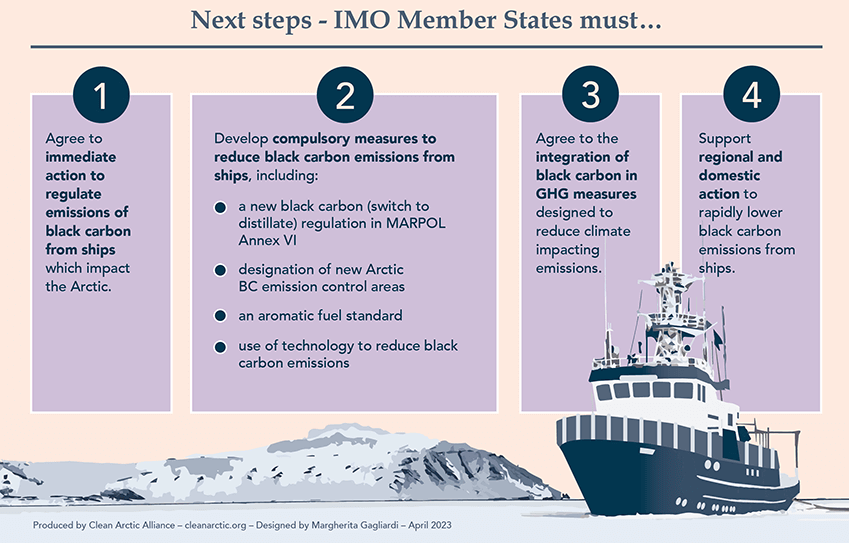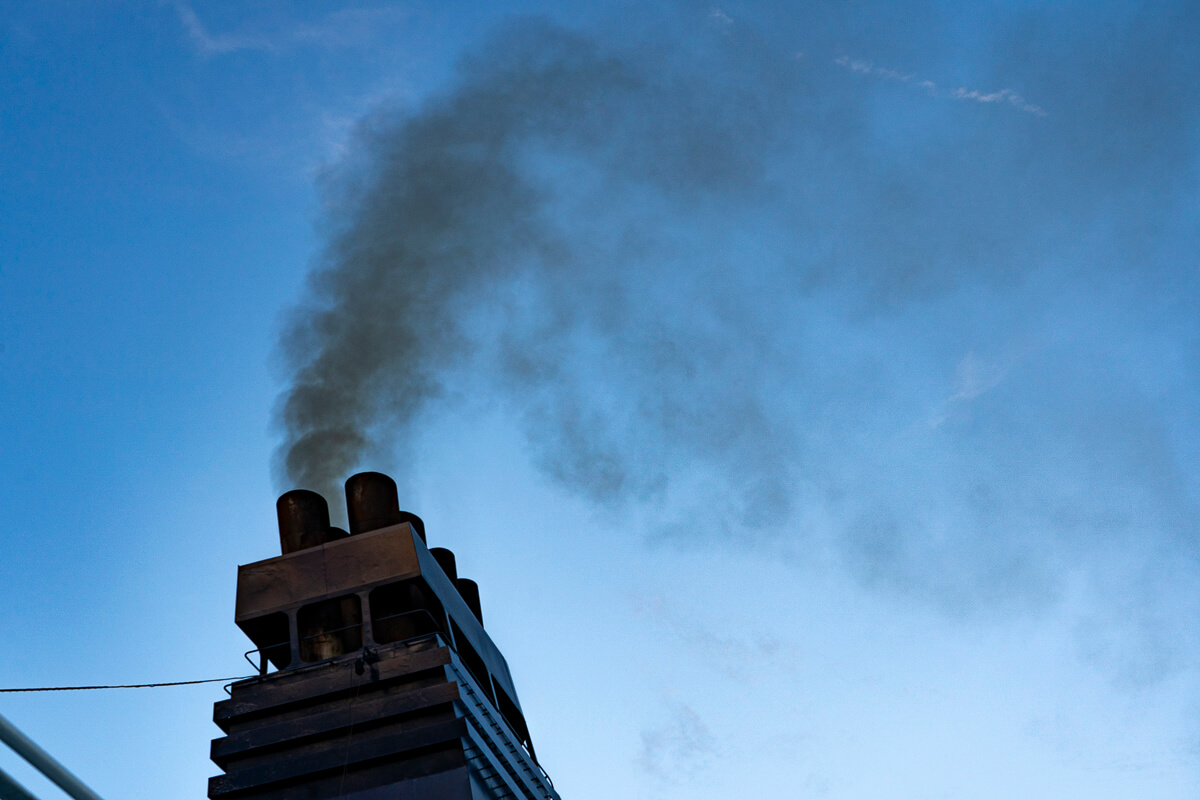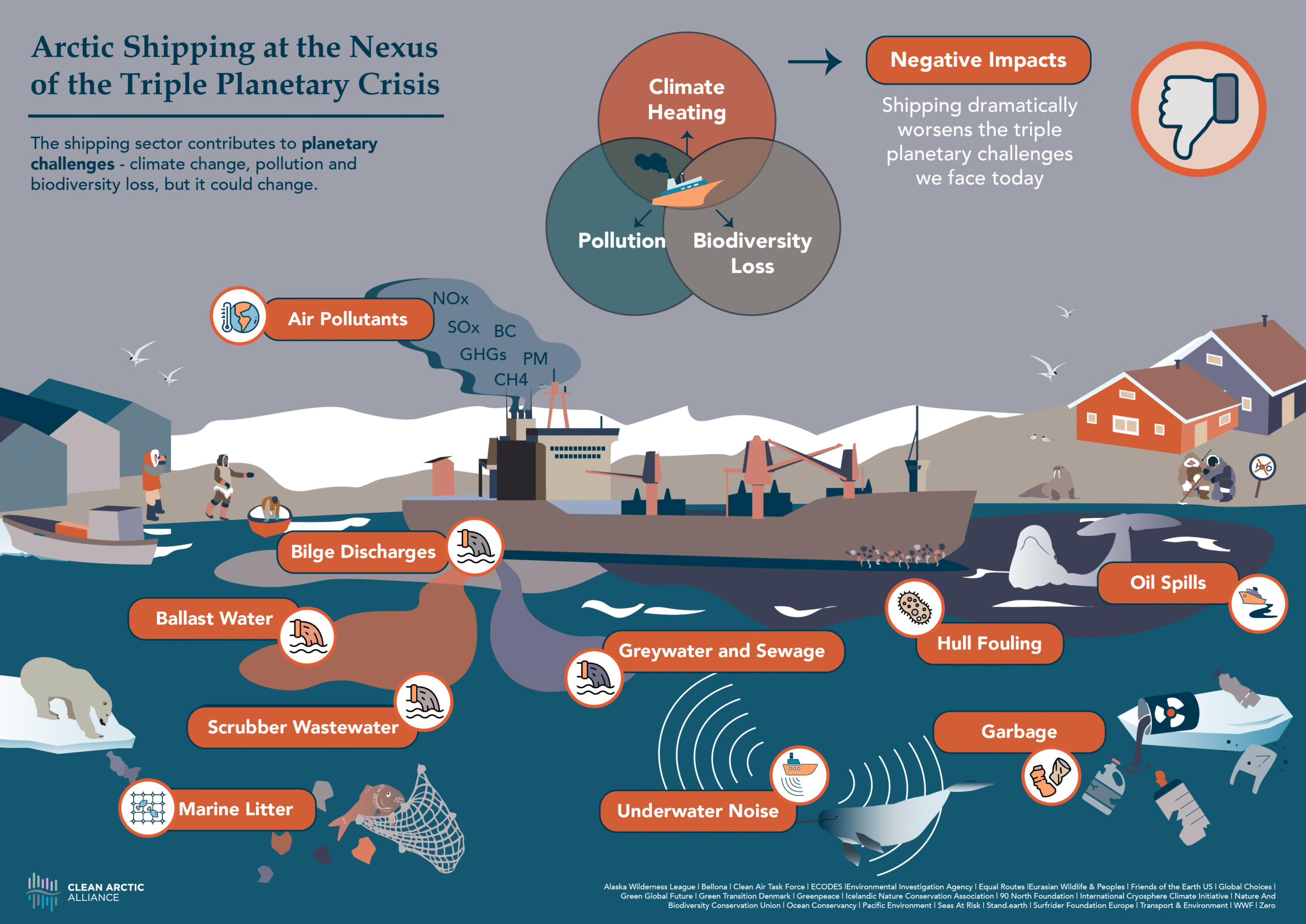London, 28 April 2023: As a meeting of the International Maritime Organization’s Pollution Prevention and Response committee closed today (PPR10), the Clean Arctic Alliance denounced the IMO’s failure to progress compulsory measures to reduce black carbon emissions from international shipping on the Arctic, and called for national governments to urgently develop concrete proposals for mandatory action for the IMO to consider at the first available opportunity in 2024.
“The failure of this week’s IMO meeting to act on black carbon emissions from the global shipping industry flies in the face of UN recognition that rapid, deep and sustained action to reduce emissions of climate pollutants including short term climate forcers (AR6 Synthesis Report) is necessary to protect the Arctic region”, said Dr Sian Prior, Lead Advisor to the Clean Arctic Alliance, a coalition of 20 international non-profit organisations.
“It appears that both national governments and the shipping industry are continuing to ignore the fact that the shipping sector is years, if not decades, behind other transport sectors, in order to continue using the dirtiest fuels which contribute to the destruction of Arctic snow and ice”, she added.
“The IMO’s decision during PPR10 to spend the next year focussing only on the development of guidelines outlining measures which could reduce black carbon emissions is nothing less than a dereliction of duty, and the Clean Arctic Alliance has little confidence that such guidelines will have the necessary effect of reducing black carbon impacts on the Arctic”, continued Prior.
Black carbon is a potent climate forcing pollutant with an impact over three thousand times that of CO2. The International Maritime Organization has already formally recognised that black carbon is the second largest source of ship climate warming, and it is responsible for around 20% of shipping’s climate impact (on a 20 year basis) . Black carbon has a disproportionately high impact when released in and near the Arctic – when emitted from the exhausts of ships burning oil-based fuel and settles onto snow and ice, it accelerates melting and the loss of reflectivity – the albedo effect – which creates a feedback loop that further exacerbates local and global heating. Learn more about black carbon here.
“In the absence of broad agreement on mandatory black carbon measures to be developed and adopted by the IMO, countries must now step forward to shoulder the responsibilities to reduce the impact of black carbon on the Arctic”, said Prior. “This means individual countries or groups of countries must take domestic action to reduce black carbon emissions impacting the Arctic, such as the designation of emission control areas, adoption of speed reduction measures which could reduce greenhouse gas emissions including black carbon, introduction of domestic bans on the use of residual fuels or fuel blends, and to bring forward to the IMO mandatory proposals such as the development of a Polar Fuel standard which would require the use of lighter, cleaner, low-carbon fuel for consideration by ships operating in and near to the Arctic.”
The Clean Arctic Alliance also welcomed Canada’s announcement of their intention to submit a proposal to the IMO’s Marine Environment Protection Committee (MEPC) for a new Emission Control Area (ECA) in Canadian waters.
“This is a very welcome development, a silver lining in an otherwise very disappointing meeting. An ECA has the potential to significantly reduce Black Carbon emissions along with NOx and SOx, and it could contribute to maintaining ice habitat for wildlife on which Inuit depend for harvesting and mobility. Action from Canada on an ECA demonstrates the urgency of the issue to reduce emissions and is also a symptom of the lack of support for an Arctic-wide mandatory measure which would reduce black carbon emissions on a global scale,” said Andrew Dumbrille, advisor to the Clean Arctic Alliance.
An amendment to the definition of heavy fuel oil heavy fuel oil (HFO) was also considered this week, with an equally disappointing outcome. Despite solid research from Norway on how marine fuels used to comply with the forthcoming ban on use and carriage for use of HFO will likely fall outside of the definition of HFO and thus not be banned, the committee decided to delay consideration to any changes to the definition until 2025.
“Deciding to wait until the HFO ban has taken effect rather than make sure the ban is effective in reducing the risk of residual oil spills from the start is backwards thinking”, said Prior. “This could mean hazardous and polluting fuels which should be banned won’t be, while habitats, wildlife, and marine resources, which many Indigenous communities depend on in the Arctic, will be at risk. If an outdated and imprecise definition of HFO is getting in the way of protecting marine areas, IMO members must act to strengthen the definition.”
“The Clean Arctic Alliance supports the proposal from Norway and Iceland to require a pour point to be included in the definition of HFO to ensure a wider range of fuel types are banned for use and carriage for use in the Arctic”, she concluded.
ENDS
Contact:
Dave Walsh, Communications Advisor, [email protected], +34 691 826 764
Notes:
- Clean Arctic Alliance PPR10 Opening Press release: Call for for Switch to Cleaner Shipping Fuel To Cut Arctic Black Carbon Emissions
- In Celebration of the Life of Verner Wilson III
- Clean Arctic Alliance Open Letter to IMO Secretary General Lim
- Clean Arctic Alliance Briefing on Agenda Item 6 of PPR10: Reduction of the impact on the Arctic of Black Carbon Emissions from International Shipping
- Watch the Clean Arctic Alliance Pre-PPR10 webinar:
- Download our new Black Carbon infographic: How to regulate and control black carbon emissions from shipping
- ICCT Briefing: Black carbon emissions from Arctic shipping: a review of main emitters and time trends
- China Dialogue: Black carbon: The ‘low-hanging fruit’ for cleaner shipping
Clean Arctic Alliance and related papers submitted to PPR10:
- PPR 10/6/3 – A Pathway for Regulations of Black Carbon Impacting the Arctic (This paper sets out a pathway and refers to a switch to distillate, ECAs, an aromatic fuel standard and diesel particulate filters)
- MEPC 79/5/5 – Amending MARPOL Annex VI to Reduce the Impact on the Arctic of Emissions of Black Carbon (forwarded by MEPC 79 to PPR 10: this paper proposes a way to regulate a switch to distillate)
- PPR 10/6/6 – Geographic Scope of Black Carbon Reduction Measures (this paper addresses geographic application of measures to reducing black carbon emissions)
- PPR 10/6/5 – From Inuit Circumpolar Council (ICC): Comments on document PPR 10/6 with regard to the reduction of the impact on the Arctic of Black Carbon emissions from international shipping
About the Clean Arctic Alliance
Made up of 20 not-for-profit organisations, the Clean Arctic Alliance campaigns to persuade governments to take action to protect the Arctic, its wildlife and its people.
Members include: The Altai Project, Alaska Wilderness League, Bellona, Clean Air Task Force, Green Transition Denmark, Ecology and Development Foundation ECODES, Environmental Investigation Agency, Friends of the Earth US, Global Choices, Greenpeace, Iceland Nature Conservation Association, International Cryosphere Climate Initiative, Nature And Biodiversity Conservation Union, Ocean Conservancy, Pacific Environment, Seas At Risk, Surfrider Foundation Europe, Stand.Earth, Transport & Environment and WWF.
More more information visit https://www.cleanarctic.org/




